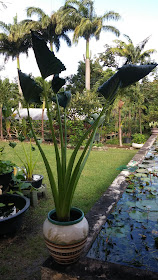The garlic vine (mansoa alliacea) is blooming, the colour of the flowers will change tomorrow to pink and the day after to white and then die.
I am growing orlaya grandiflora for the first time and I am quite pleased even though it took some time to grow from seed.
I planted out one of my loquats recently and am hoping to get some fruit in another year or so.
Alocasia tea cups doing well in a soggy soil. These can be grown in shallow water and are great for pond banks.
Remember the blackberry I had grown from seed? Well I transplanted it into a tyre pot made from a recycled tyre. Since I have read the roots do not grow deep I think this is an ideal container for it.
The other two seedlings are doing well and I am looking to transplant them soon.
I am also growing jicama for the first time and they do resemble a terrible wild vine we have call cow itch that is dangerous if the fine hairs off the seed pods get on your skin.
The tuber is edible while the flowers and seed pods are toxic. The tuber is sweet tasting and is used raw in salads or stir fried with other vegetables. These should be soon ready for harvesting as soon as the seed pods are dried. I read they can be eaten about now but I am waiting for seeds to replant. These were grown many years ago here in Barbados by the Taiwanese who were assisting our farmers on agricultural projects. When they left the jicama was forgotten. I plant to resurrect this crop again.
The leaves, flowers and seed pods contain rotenone a natural pesticide however that doesn't deter the slugs and snails. Rotenone is the pesticide most often used to kill fish.
Rotenone is a naturally occurring compound derived from the roots of certain tropical and subtropical legume plants. Humans have been using it for centuries to harvest fish and manipulate fish communities. Rotenone kills by interfering with cellular use of oxygen.
I had some sweet potatoes that started growing so I cut off the growing tips and planted them in a container. I peeped and look what I found. Will harvest them at the end of the month.
The morning sunlight across the the orchard. We have had rain almost every day in January. That was the wettest January I can remember. The garden is loving the extra moisture. I am hoping our dry season won't be as dry as last year. Thanks for stopping by and have a great day!














Hi Helen, you have a very clean and lovely orchard. I've just planted garlic vine to climb a jackfruit that is not growing well anymore, guess it succumbed to Phytophthora fungus. My sister wanted to cut the small tree but i opted to have it as trellis for my garlic vine. I hope in a year's time i will already have flowers.
ReplyDeleteThank you Andrea, you will have many years of joy with the garlic vine and you will have to do a lot of pruning since it can take over.
DeleteHi Helen, Liked the Mansoa. The changing flower colours remind me of Tibouchina varieties that do the same thing It looks like quite a sizeable shrub or is it as Andrea suggests a vigourous vine.
ReplyDeleteHello Terry,
DeleteYes the garlic vine is huge if you allow it do its thing. It still takes my breath away when it blooms.
ReplyDeleteHi Helen,what a beautiful garden with an arrayof exotic flowers and luscious fruits.Great job !! atBenthams house St Lucy Barbados Jenny.
Hey Jenny thank you for stopping by and I hope one day you will visit the garden.
Delete